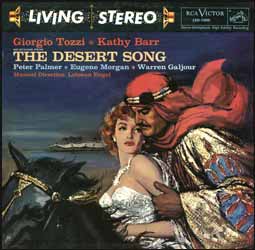|
Click here to return to the main site. Music Review
In the Moroccan desert a French outpost is under threat from the Riffs, a band of Arab freedom fighters. General Birabeau is sent to deal with their leader, another Frenchman, the romantically named ‘Red Shadow’. Together with his Arab lieutenant, Sid El Kar and their wealthy Arab benefactor Ali Ben Ali, the Red Shadow, actually Birabeau’s son Pierre, discuss the relative merits of love in both western and Arab tradition. Pierre is secretly in love with Margot Bonvalet, who is unfortunately betrothed to the fort's captain Fontaine. Having discovered that Margot dreams of being romantically swept away, he kidnaps her as his alter ego, hoping to win her heart... The Desert Song (1958 version) is a romantic operetta with music by Sigmund Romberg and book and lyrics by Oscar Hammerstein II, Otto Harbach and Frank Mandel. Since its first production in 1926, it has been revived a number of times and even spawned two film versions. Since the advent of Valentino, the idea of being swept away and held helpless by a romantic male character had been a popular theme, so it was not surprising that The Desert Song should come along in the same year that Valentino died, although disguise in the pursuit of romance has a much longer history. It would be relatively easy to go off on one, with a psychoanalytical look at the operetta’s themes looking at the subliminal rape themes, but this is an operetta from a simpler age. I’m pretty sure that such an interpretation would not have occurred to the original writers. So what we have is a pretty fluffy bit of romantic nonsense. In fact its approach is relatively mawkish and has subsequently been lampooned by other writers. The version on offer in this recording dates from 1958 with Georgio Tozzi, Kathy Barr and Peter Palmer, with music direction from Lehman Engel. Although it has been previously released on vinyl, this is the first time it’s been offered in a digital format, that said it still represents one of the more obscure recordings of the show. Not that the show lacks quality in its performers, Georgio Tozzi famously dubbed the singing voice of Emile de Becque character in the film version of South Pacific. Kath Barr also had an illustrious stage career. The music, with its fourteen tracks, has understandably dated since it first inception, the album opens with 'Prelude and Opening Chorus' (1 min, 37 sec) which introduces some of the music themes of the show with sweeping orchestration which brings forth images of a desert before changing to a strident, militaristic sound introducing some of the main characters. 'The Riff Song' (1 min, 29 sec) introduces us to the Shadow, although the song sounds more like it should be out of a western. 'O! Pretty Maid of France' (37 sec) is too short to be considered a song, but it’s a jolly ditty. 'Why Did We Marry Soldiers?' (1 min, 09 sec) is sung by the female chorus bemoaning the plight of a soldier’s wife, with the men off fighting the Riffs and would not sound out of place in The Mikado. 'French Military Marching Song' (2 min, 51 sec) is neither a marching song nor is it sung by the male chorus as the title would suggest, but another song from the girl's singling about the soldiers. 'Romance' (3 min, 43 sec) and we hit the ubiquitous love song, another song whose sensibilities sound more like it should come from a western. It’s a lovely lilting number, though I couldn’t but help feel that it compared poorly to 'Stranger in Paradise', a song with a similar theme of love. 'Then You Will Know' (3 min, 18 sec) is the male counterpoint love song to ‘Romance’. It’s actually quite a funny song with Pierre offering gentle courtship while Margot’s really after a bit of bodice ripping action. 'I Want a Kiss' (2 min, 29 sec) is a song to Margot having to explain how she was trying to instruct Pierre in the art of romance. 'The Desert Song' (5 min, 35 sec) is a lush, string filled duet, possibly the best track, with Kathy Barr (Margot) giving a powerful soprano performance which is perfectly matched by Georgio Tozzi (Pierre) deeply rich baritone. The first half of the show wraps with 'Finale Act 1' (6 min, 54 sec) where many of the musical themes are revisited. Oddly, the second act of the show is only represented by the 'Opening Chorus Act II' (37 sec), 'Eastern and Western Love' (8 min, 19 sec), 'The Sabre Song' (3 min, 44 sec) and the 'Act II Finale' (4 min, 05 sec), this represents a truncated version of the second act, presumably the other tracks were not recorded due to the time limitations of the original vinyl release. Georgio Tozzi and Kathy Barr both have wonderful voices; even if the material here isn’t the strongest. Although popular in its day the musical arrangement have not aged well. However, I continually remain impressed with the clarity of these old recordings; it’s obviously either been taken from the original tapes or been significantly reconstructed as there is little noticeable distortion either in Barr’s high soprano notes or muffling in Tozzi’s deeper baritone tones. For collectors of Broadway shows its worth giving this recording a listen, it may be truncated but it’s a good example of Georgio Tozzi’s and Kathy Barr’s work. 6 Charles Packer |
|---|

